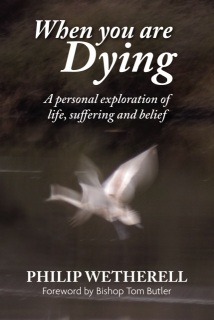When you are Dying: A personal exploration of life, suffering and belief by Philip Wetherell
This moving book was written with great difficulty by an Anglican priest with motor neurone disease at the end of life, and its ruthless honesty is challenging and compelling. I was moved in reading it, and I think it will be helpful to many who face life-shortening illnesses themselves or in those they love; so I hope it will be widely read. |
|
|
FOREWORD:
I believe this to be a very significant book. It is a moving yet unsentimental account of the last few months in the life of a man, Philip Wetherell, who was suddenly diagnosed with Motor Neurone Disease. He died before the book was completed, by which time he was almost totally paralysed and the book was written a single letter at a time with the aid of eye movements and a computer. It was completed by Gaby, Philip's wife, former colleague and latterly his carer. Philip writes with transparent honesty about life and death, pain and suffering, faith and fear. His priestly ministry had taken Philip through the mission agency he served to many parts of the globe but he and Gaby had also been rooted for some years in an inner city south London parish. All this is part of the mix which helps Philip to reflect, theologically and with humanity, upon his situation. One of the most significant sections is that which describes precisely what it is like to live with a disease which gets progressively more severe. He explains that every miracle of medical technology which aids the sufferer can also be seen as a sign that the situation is becoming worse. Another important section is that on assisted suicide because for Philip of course this was no theoretical issue. He rigorously examines the arguments against this but concludes that he feels that the Church is mistaken in opposing it, although stating that he does not know whether he would have the courage himself to request it. He also records that, from his own situation, he is aware that things can change from day to day partly through the effect of certain drugs. Towards the end Philip records that he was totally dependent on others and felt unable to give them anything in return, except this book! It is his final gift to those who knew him, loved and admired him, and it is a gift well worth having. Uniquely we have a thoughtful record from inside the mind of a priest and a man approaching death in the most difficult of circumstances. Everyone will be enriched through reading this book. +Tom Butler, former Bishop of Southwark |
Facing death is not an easy matter. Not when your days are counted. Not when it is evident your body is deteriorating, and your will to fight slowly diminishes. Not when all you can do is to take a deep breath and a defiant stand before God for his apparent absence from a depraved world, a world that moves adrift in the overall scheme of creation. Not when this defiant stand betrays a sense of nostalgia for someone who is no longer there, side by side with Gaby, his wife, Philip has written a poignant story. His book will touch many a reader, regardless of his or her own condition. This is so because it is written with the passion of a heart that is dying against his will and because the writer wants his words of wisdom about his own experience of life and death to last and to survive him. This is why I highly recommend reading this exceptional book. We thank God for Philip's practical vision on many issues touching human life. Working in different positions in USPG for many years he was able to engage with the World Church and help various parts thereof to engage with each other. I saw Philip in Mozambique and in London and he showed to be very much engaged. His book will be a faithful witness of what he meant to many. Philip was a special person. He helped greatly in missionary work in South West Brazil when he visited here as Anglican Secretary, In USPG he was a faithful companion. His kindness and caring have always been a complement to his seriousness. God gave him this destiny mysteriously soon. To him and his dear Gaby we owe our honour and our gratitude.' This book is a thoughtful reflection on the encounter with dying and death and the issues they raise about faith in God. I strongly recommend it for personal and group reflection. |

